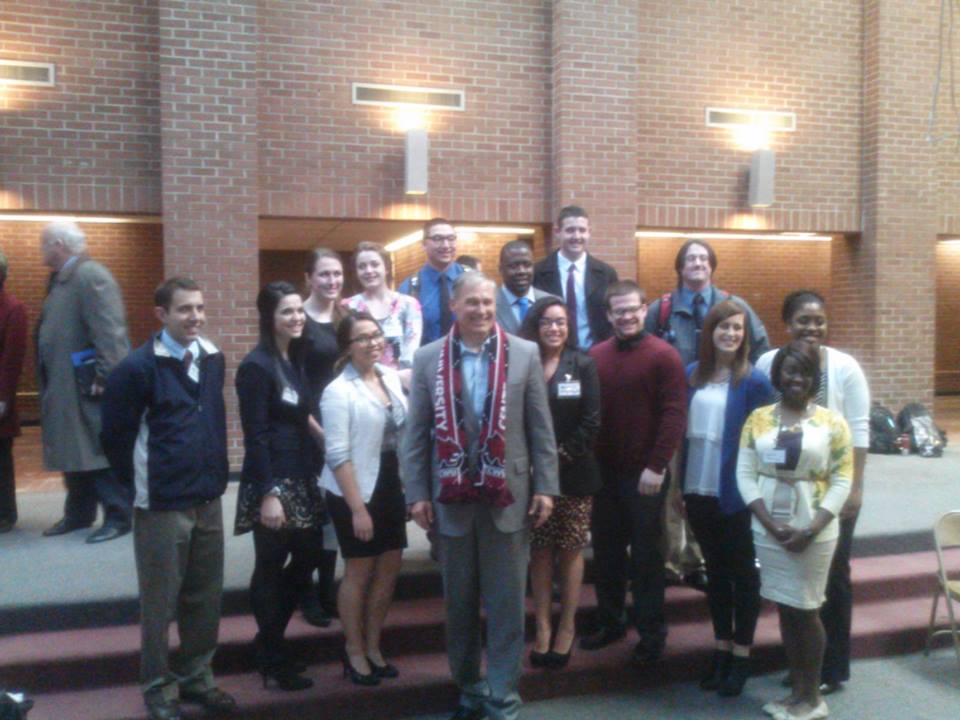Inslee’s current budget draft neglects reinvestment in higher education
March 4, 2015
The word of the day around campus on Wednesday was ‘budget’. Governor Jay Inslee (D) met with students in the old Samuelson building for an hour beginning at 3:30 to field questions.
Bill Lyne, president of United Faculty of Washington State, met with Central faculty at 5:30 to discuss budget issues, including Governor Inslee’s higher education budget proposal.
While answering students questions, Inslee plugged for his budget model, in which he promises to continue the current tuition freeze.
He talked about closing some major corporate loopholes in Washington. He also touched on levying a carbon tax on some of the state’s largest polluters, in addition to trying to reform Washington’s tax model.
Another proposal was for a capital gains tax for amounts greater than $50,000.
Currently, Washington’s tax model is universally hailed as the most regressive in the nation, hitting the middle and working classes much harder than it does major corporations and wealthy citizens.
The revenue gained from these measures would be allocated, according to Inslee, to public transportation infrastructure and education, encompassing pre-K, K-12 and higher education.
Lyne said these would be good measures, but has some immediate concerns.
As Inslee’s budget sits currently, there is no hikes in tuition planned, but there is also no reinvestment of state funds into higher education.
What this means for students is that even though they will not see their tuition rise, funding for state universities will decrease.
No new reinvestment means that state allocated funds will not move up to keep pace with inflation, increasing student load and operation costs. It can be viewed as a budget cut where the faculty and staff of state universities are being asked to do more and more with less and less resources.
Lyne said that if this budget passes, it will have immediate and devastating results. It would increase graduation times and force larger class sizes.
Washington state already has the second lowest funded state universities in America; only Florida spends less dollars-per-student on higher education than Washington.
Lyne said that a large part of this is due to the influence that mega-corporations like Boeing and Microsoft levy on our state legislature.
These corporations have an interest in keeping their tax rates low, as they don’t rely heavily Washington’s four-year higher education systems.
Increasing tax rates could mean more revenue for Washington’s domestic four-year higher education infrastructure
Inslee’s proposal to fix corporate loopholes as well as push for a more progressive tax rates are designed to partially help fund higher education of Washingtonians in Washington.
This news did come with reservations. Inslee said there have been $12 million in cuts to social services, including mental health, and that he would not cut social services further to fund higher education.
Additionally, the McCleary decision handed down by the Supreme Court found Washington to be in contempt of providing adequate K-12 funding. Inslee made clear that this is a priority, as well as funding pre-K education.
At one point, Inslee said that if he had a dollar and had to choose between sending it to pre-K or higher education, he would choose pre-K.
When asked how he would reform public education, particularly K-12, he skirted the issue and opted to give another plug for passing his budget.
“One of the favorite things for politicians to do in Olympia is to pit people against each other,” Lyne said.
If the carbon tax and capital gains tax were enacted, they’re projected to generate around $1.7 billion dollars.
Since around 2008, affordability of public education has become a campaign issue. Lyne said that in his experience, legislators are concerned with counting two things: dollars and votes.
Traditionally, higher education has provided neither.
However, coinciding with the increase in tuition and public awareness of the price of college education, most Washington politicians have reframed themselves as higher education advocates.
Unionization and collaboration between different organizations, like United Faculty of Washington State, has also placed pressure of legislators, Lyne said.
Lyne believes that there is no way to adequately fund higher education in Washington, or potentially improve it, without generating new revenue. Inslee’s question and answer session, with it’s proposed tax reforms suggested the same. It does beg the question then: Why is there no state money reinvested in the current budget proposal coupled with a tuition freeze?
Lyne said the very fact that Governor Inslee came to Central to talk with students about higher education is a sign of progress.
A finalized Washington budget draft is scheduled to be voted on March 23 in the legislature.


